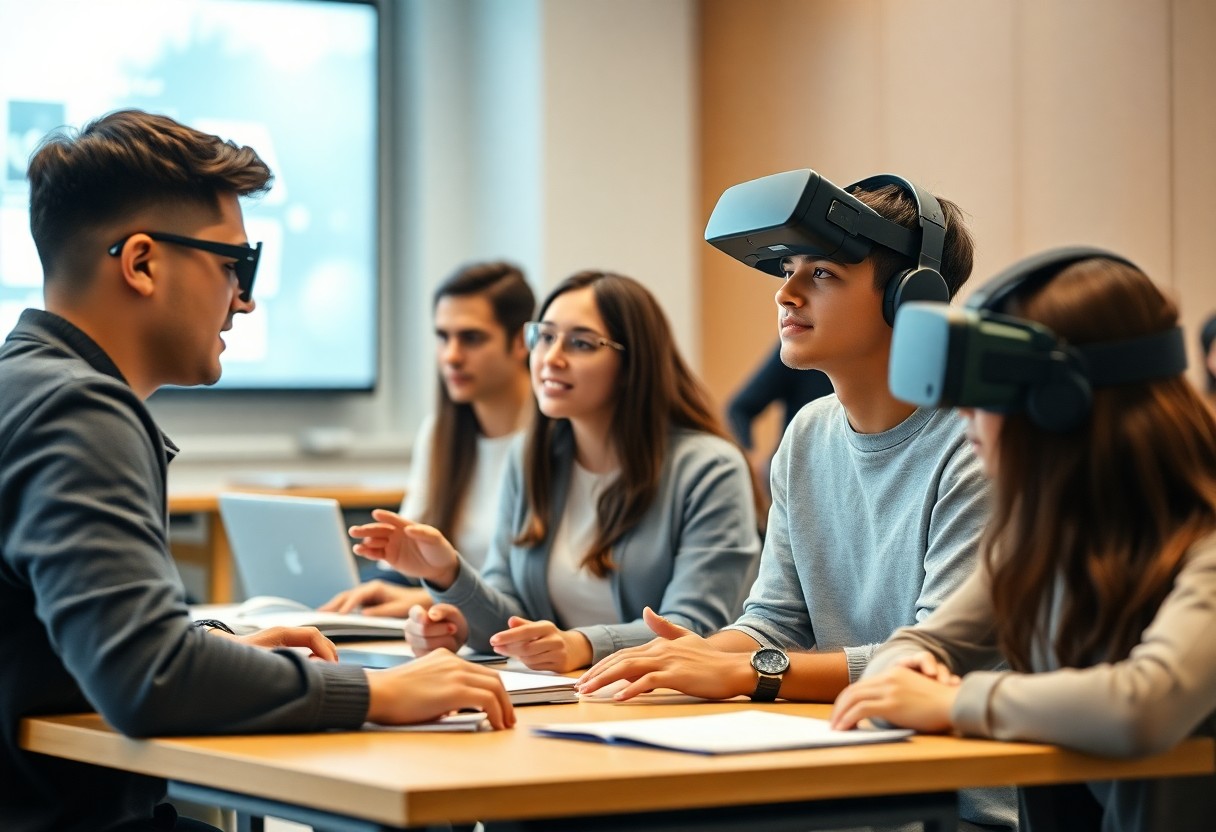Most educators and learners are witnessing the transformative potential of AI-assisted learning, yet the integration of neuroeducation principles into this paradigm can unlock even deeper insights. Understanding how cognitive processes underpin learning, you can leverage neuroeducation strategies to optimize your engagement, retention, and application of knowledge. This post dives into the compelling intersection of neuroscience and artificial intelligence, offering you a clearer perspective on enhancing your learning experiences through research-backed approaches.
Key Takeaways:
- Personalized Learning: Neuroeducation principles emphasize tailoring educational approaches to individual neurocognitive profiles, leading to more effective and engaging AI-assisted learning experiences.
- Enhanced Motivation: Understanding how motivation impacts learning allows AI systems to create environments that foster intrinsic motivation, improving learner engagement and outcomes.
- Data-Driven Insights: Combining neuroeducation with AI enables the analysis of vast amounts of learner data, providing valuable insights into cognitive processes and informing instructional strategies for better educational practices.
Understanding Neuroeducation
Before delving into the nuances of AI-assisted learning, it is crucial to grasp the fundamental concept of neuroeducation. This interdisciplinary field merges neuroscience, psychology, and education to enhance teaching methods and learning experiences. By understanding how your brain processes information, you can apply these insights to cultivate more effective strategies for academic success.
Definition and Principles
The principles of neuroeducation revolve around how neural pathways form during learning experiences. This approach emphasizes the brain’s plasticity, highlighting that your capacity to learn and adapt can be significantly enhanced through intentional educational practices.
Relevance to Learning Processes
Learning within the context of neuroeducation focuses on how the brain functions during various educational activities. By integrating neurological insights, you can develop strategies that promote retention, motivation, and critical thinking skills, all necessary components of effective learning.
Understanding the relevance of neuroeducation to your learning processes can transform your educational experience. By applying techniques informed by neuroscience, such as spaced repetition and mindfulness, you can improve memory retention and comprehension. Additionally, recognizing your unique cognitive strengths allows you to tailor your approaches to learning, making them more effective and impactful. This tailored approach not only engages your brain more effectively but also fosters a lifelong love for learning.

The Role of AI in Education
Assuming you grasp the significance of artificial intelligence in modern education, it’s crucial to recognize how AI is reshaping the learning landscape. AI technologies offer innovative solutions that enhance teaching methodologies and streamline administrative tasks. Moreover, they enable educators to focus more on engaging students on a personal level, thus fostering a more dynamic and effective learning environment.
Enhancing Learning Experiences
One way AI transforms education is by enhancing learning experiences through interactive tools and simulations. These innovations create immersive environments where you can explore subjects in-depth, leading to greater retention of information and improved problem-solving skills.
Personalization and Adaptive Learning
The ability of AI to provide personalization and adaptive learning experiences is revolutionary. It tailors educational content to your learning style and pace, ensuring that you receive the support and challenges that match your unique needs.
Education is evolving to provide customized experiences that fit every individual’s learning journey. AI algorithms analyze your strengths, weaknesses, and preferences, allowing for real-time adjustments in content delivery. This personalized approach ensures you remain engaged and motivated, enhancing your overall educational outcomes and facilitating a more effective learning process.
Intersection of Neuroeducation and AI
Unlike traditional educational methods, the intersection of neuroeducation and AI opens new avenues for personalized learning experiences. By integrating insights from neuroscience with cutting-edge AI technology, you gain a deeper understanding of your learning processes. This synergy allows educators to tailor their methods to not only better engage students but also enhance their cognitive development, paving the way for more effective educational practices.
Cognitive Neuroscience Insights
To fully leverage AI in education, it’s necessary to understand the cognitive neuroscience insights that inform learning processes. Neuroscience reveals how your brain functions during learning, including the roles of memory, attention, and emotional engagement. These insights enable the development of algorithms designed to align instructional content with how your brain naturally learns, making your educational experience more effective and intuitive.
Implications for Learning Strategies
An important aspect of integrating neuroeducation with AI lies in the implications for your learning strategies. As AI systems analyze data on your learning preferences and progress, they can provide personalized feedback and recommendations tailored to optimize your study habits and comprehension.
It’s crucial to recognize that these personalized learning strategies can greatly enhance your educational outcomes. By utilizing AI-enabled platforms that adapt to your unique learning style, you can focus on areas where you need improvement while reinforcing your strengths. This tailored approach not only promotes greater engagement but also facilitates a deeper understanding of the material, ultimately leading to more successful learning experiences. By harnessing the insights from neuroeducation, you can make informed decisions about how to approach your studies effectively.
Data-Driven Approaches
Despite the wealth of information available, harnessing data-driven approaches in neuroeducation can be a game changer in AI-assisted learning. By leveraging vast datasets, you can identify trends and patterns that help tailor educational experiences to individual needs. This empowers educators to make informed decisions, ensuring that learning strategies align with the neurocognitive profiles of students, ultimately enhancing their educational outcomes.
Analyzing Learning Behaviors
Learning behaviors can reveal crucial insights into how students interact with educational content. By tracking engagement metrics, such as time spent on tasks and response patterns, you can uncover individual learning preferences and struggles. This information enables the customization of learning paths, making it easier for you to cater to diverse student needs and improve retention rates significantly.
Predictive Analytics in Education
Approaches to predictive analytics in education utilize collected data to forecast student performance and potential outcomes. By analyzing historical data, you can input various learning variables to create predictive models that help understand which factors influence student success. This allows educators to intervene strategically before challenges arise, tailoring support to your specific learning trajectory.
A holistic approach to predictive analytics can transform educational strategies by enabling proactive, data-informed decision-making. You benefit from timely interventions and resources tailored to your unique learning journey, ensuring you remain on track for academic success. Furthermore, as educators better understand your evolving needs through predictive insights, they can refine their methodologies, fostering a more engaging and effective learning environment.
Challenges and Ethical Considerations
After exploring the promising potential of neuroeducation in AI-assisted learning, it’s crucial to address the associated challenges and ethical considerations. As you navigate this evolving landscape, you must consider the implications of data usage, student engagement, and the integrity of educational practices. Fostering an environment where technology enhances learning without compromising ethical standards remains paramount.
Privacy Concerns
Privacy is a significant concern when integrating AI technologies into educational settings. As AI collects vast amounts of data on students, ensuring that this sensitive information is stored securely and used ethically is paramount. You should be aware of the potential risks related to data breaches and misuse, and strive to implement robust privacy policies that protect your students’ personal information while still leveraging the benefits of AI.
Equity and Access Issues
An important issue in AI-assisted learning is equity and access. You may encounter disparities in how technology is accessed among students from differing socio-economic backgrounds. Providing equitable opportunities for all learners is vital, and recognizing these challenges allows you to advocate for policies that enhance access to critical educational resources, ensuring every student has the tools they need to succeed.
Ethical considerations surrounding equity and access extend beyond mere technology availability. You must actively work to identify and dismantle structural barriers that prevent underrepresented students from accessing AI-enhanced learning experiences. This includes ensuring that your educational approaches are inclusive, and advocating for resources and training that empower all educators to effectively integrate AI into their teaching practices. By committing to equity, you play a pivotal role in crafting a more just and inclusive educational landscape.
Future Directions in AI-Assisted Learning
All signs point to a transformative future in AI-assisted learning, where technology becomes increasingly adaptable to individual needs. With advancements in neuroeducation, you can expect AI systems that not only personalize learning pathways but also enhance engagement and retention. This evolving landscape promises more efficient, tailored educational experiences that leverage your learning style, cognitive abilities, and preferences.
Emerging Technologies
Emerging technologies are rapidly reshaping the educational landscape, enabling innovative approaches to learning. You will witness tools such as virtual reality, augmented reality, and machine learning algorithms that adapt in real-time to your learning process. By integrating these technologies, AI-assisted learning can provide immersive and interactive experiences that cater to your unique educational requirements.
Evolving Learning Environments
To harness the full potential of AI-assisted learning, evolving learning environments will prioritize collaboration and interactivity. You will find that educational spaces—whether physical or virtual—are becoming designed to support diverse learning experiences. These environments will facilitate peer interactions and foster an inclusive atmosphere where your individual needs and goals can be seamlessly integrated into the learning journey.
Learning environments are no longer confined to traditional classrooms; they are evolving into dynamic, collaborative spaces that embrace diversity in learning styles. You can expect to see more flexible settings equipped with technology that encourages peer interaction and individualized learning experiences. These environments will not only support your social and emotional needs but also allow for an adaptive approach, making learning more effective and engaging. As AI continues to shape educational practices, fostering a community where everyone can thrive will be crucial for your overall development.
Summing up
From above, you can derive that neuroeducation in AI-assisted learning significantly enhances your educational strategies by integrating neuroscience insights into technology-driven environments. This fusion allows you to tailor learning experiences to ethical and cognitive needs, optimizing retention and engagement. By understanding how the brain processes information, you can implement AI tools more effectively, assuring that your educational practices are not only innovative but also grounded in proven scientific principles. Embracing this knowledge enables you to foster a deeper connection with learners, ultimately leading to more effective and personalized educational outcomes.
FAQ
Q: What is neuroeducation and how does it relate to AI-assisted learning?
A: Neuroeducation is an interdisciplinary field that combines neuroscience, psychology, and education to understand how the brain learns. It aims to apply findings from brain research to improve educational practices, enhancing learning outcomes. In the context of AI-assisted learning, neuroeducation helps to inform the design of AI systems that can adapt to individual learning styles, cognitive functions, and emotional states, ultimately creating more personalized and effective educational experiences. By leveraging insights from neuroeducation, AI can tailor content delivery and assessment methods to better align with how students learn best.
Q: What specific insights can we gain from neuroeducation to improve AI-assisted learning outcomes?
A: Insights from neuroeducation can lead to multiple improvements in AI-assisted learning. For example, understanding cognitive load can enable the development of AI tools that manage and optimize information delivery, ensuring that learners are neither overwhelmed nor under-challenged. Additionally, findings about the role of emotions in learning can help AI systems to recognize when students are disengaged or frustrated, allowing for timely interventions. Furthermore, insights into memory formation and retrieval can guide the design of adaptive learning scenarios that reinforce knowledge retention. Overall, these insights can help create more engaging, responsive, and effective educational environments driven by AI.
Q: How do we measure the effectiveness of integrating neuroeducation insights into AI-assisted learning systems?
A: The effectiveness of integrating neuroeducation insights into AI-assisted learning can be measured using various quantitative and qualitative metrics. These may include assessing improvements in student engagement, retention rates, academic performance, and overall learning satisfaction through surveys and analytics. Pre- and post-intervention assessments can help track knowledge gains, while user feedback can provide subjective insights into the learning experience. Additionally, brain-based metrics, such as neuroimaging or biometric data, can be utilized to observe changes in cognitive processes during learning. By triangulating these measurements, educators and researchers can evaluate the impact of neuroeducation-informed AI techniques on learning outcomes.




